HR Strategies for Hotel Success: Retention, Compensation, and Training
VerifiedAdded on 2023/05/30
|7
|1500
|329
Report
AI Summary
This report delves into the critical role of Human Resource (HR) management within the hospitality industry, emphasizing its impact on employee retention, compensation strategies, and training programs. The report highlights how effective HR practices are essential for creating satisfied customers, as employees directly influence the customer experience. It discusses various aspects of employee retention, including the importance of recruitment and selection, induction processes, and creating a positive work environment. The report also explores compensation packages, including pay, benefits, and financial incentives. Furthermore, it emphasizes the significance of employee training to improve skills and ensure customer satisfaction, and the need for HR managers to adapt to the changing industry landscape. The conclusion underscores the need for HR managers to prioritize employee satisfaction through equitable and competitive compensation to reduce labor turnover and improve the overall performance of the business. The report references various sources to support its claims.

Running Head: MANAGEMENT PRINCIPLE 0
MANAGEMENT PRINCIPLE
HR – RETENTION, COMPENSATION AND TRAINING
MANAGEMENT PRINCIPLE
HR – RETENTION, COMPENSATION AND TRAINING
Paraphrase This Document
Need a fresh take? Get an instant paraphrase of this document with our AI Paraphraser
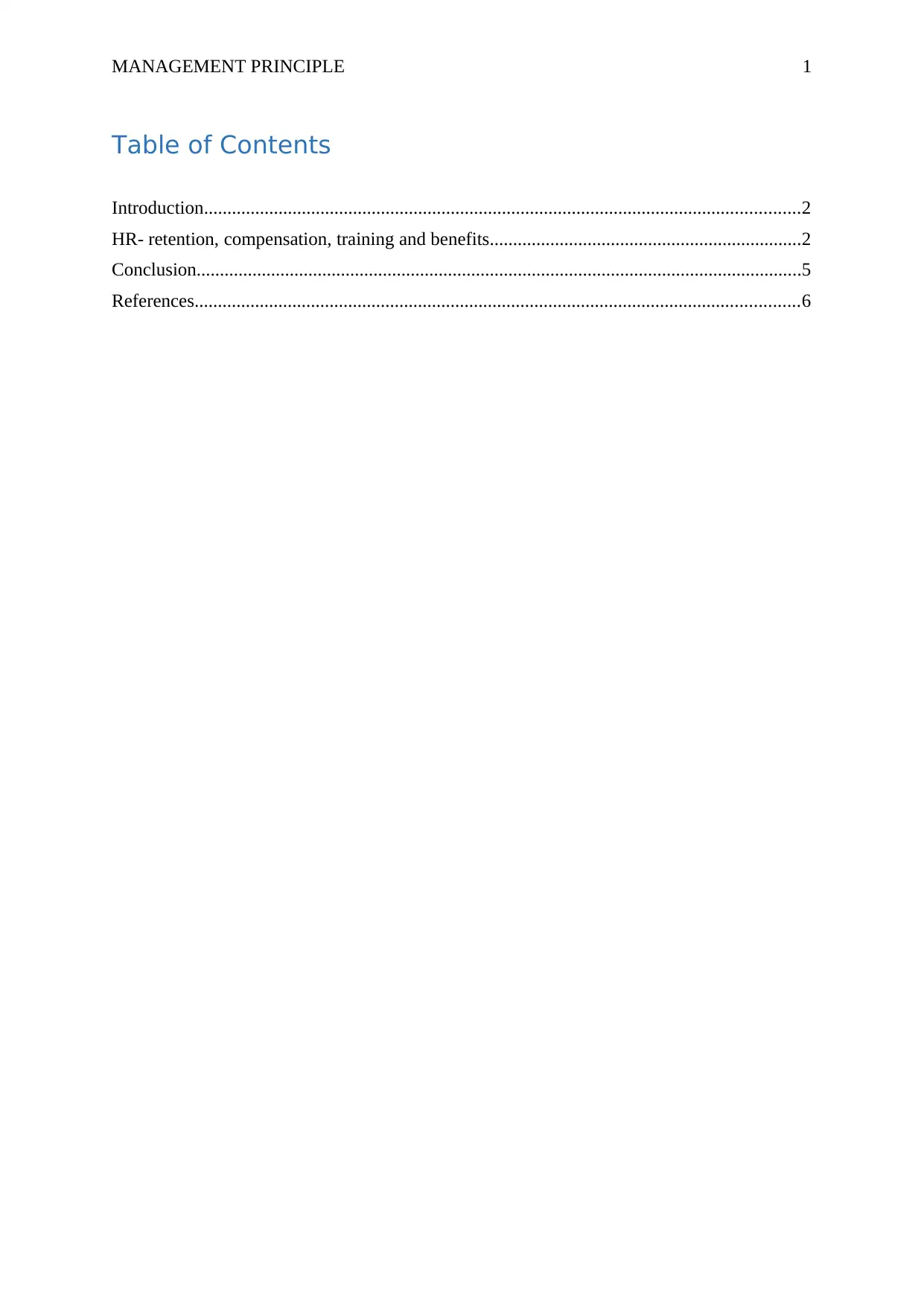
MANAGEMENT PRINCIPLE 1
Table of Contents
Introduction................................................................................................................................2
HR- retention, compensation, training and benefits...................................................................2
Conclusion..................................................................................................................................5
References..................................................................................................................................6
Table of Contents
Introduction................................................................................................................................2
HR- retention, compensation, training and benefits...................................................................2
Conclusion..................................................................................................................................5
References..................................................................................................................................6
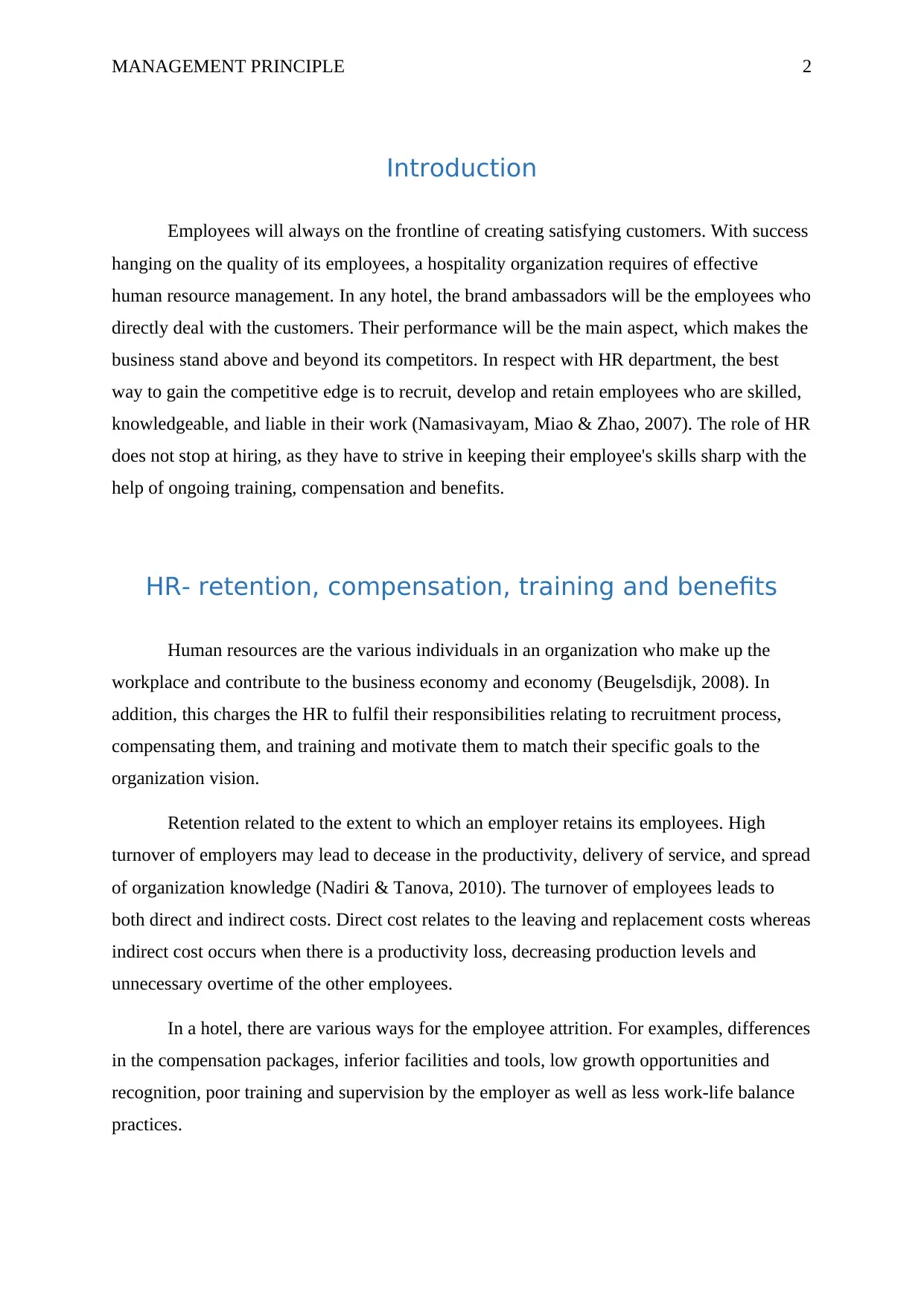
MANAGEMENT PRINCIPLE 2
Introduction
Employees will always on the frontline of creating satisfying customers. With success
hanging on the quality of its employees, a hospitality organization requires of effective
human resource management. In any hotel, the brand ambassadors will be the employees who
directly deal with the customers. Their performance will be the main aspect, which makes the
business stand above and beyond its competitors. In respect with HR department, the best
way to gain the competitive edge is to recruit, develop and retain employees who are skilled,
knowledgeable, and liable in their work (Namasivayam, Miao & Zhao, 2007). The role of HR
does not stop at hiring, as they have to strive in keeping their employee's skills sharp with the
help of ongoing training, compensation and benefits.
HR- retention, compensation, training and benefits
Human resources are the various individuals in an organization who make up the
workplace and contribute to the business economy and economy (Beugelsdijk, 2008). In
addition, this charges the HR to fulfil their responsibilities relating to recruitment process,
compensating them, and training and motivate them to match their specific goals to the
organization vision.
Retention related to the extent to which an employer retains its employees. High
turnover of employers may lead to decease in the productivity, delivery of service, and spread
of organization knowledge (Nadiri & Tanova, 2010). The turnover of employees leads to
both direct and indirect costs. Direct cost relates to the leaving and replacement costs whereas
indirect cost occurs when there is a productivity loss, decreasing production levels and
unnecessary overtime of the other employees.
In a hotel, there are various ways for the employee attrition. For examples, differences
in the compensation packages, inferior facilities and tools, low growth opportunities and
recognition, poor training and supervision by the employer as well as less work-life balance
practices.
Introduction
Employees will always on the frontline of creating satisfying customers. With success
hanging on the quality of its employees, a hospitality organization requires of effective
human resource management. In any hotel, the brand ambassadors will be the employees who
directly deal with the customers. Their performance will be the main aspect, which makes the
business stand above and beyond its competitors. In respect with HR department, the best
way to gain the competitive edge is to recruit, develop and retain employees who are skilled,
knowledgeable, and liable in their work (Namasivayam, Miao & Zhao, 2007). The role of HR
does not stop at hiring, as they have to strive in keeping their employee's skills sharp with the
help of ongoing training, compensation and benefits.
HR- retention, compensation, training and benefits
Human resources are the various individuals in an organization who make up the
workplace and contribute to the business economy and economy (Beugelsdijk, 2008). In
addition, this charges the HR to fulfil their responsibilities relating to recruitment process,
compensating them, and training and motivate them to match their specific goals to the
organization vision.
Retention related to the extent to which an employer retains its employees. High
turnover of employers may lead to decease in the productivity, delivery of service, and spread
of organization knowledge (Nadiri & Tanova, 2010). The turnover of employees leads to
both direct and indirect costs. Direct cost relates to the leaving and replacement costs whereas
indirect cost occurs when there is a productivity loss, decreasing production levels and
unnecessary overtime of the other employees.
In a hotel, there are various ways for the employee attrition. For examples, differences
in the compensation packages, inferior facilities and tools, low growth opportunities and
recognition, poor training and supervision by the employer as well as less work-life balance
practices.
⊘ This is a preview!⊘
Do you want full access?
Subscribe today to unlock all pages.

Trusted by 1+ million students worldwide
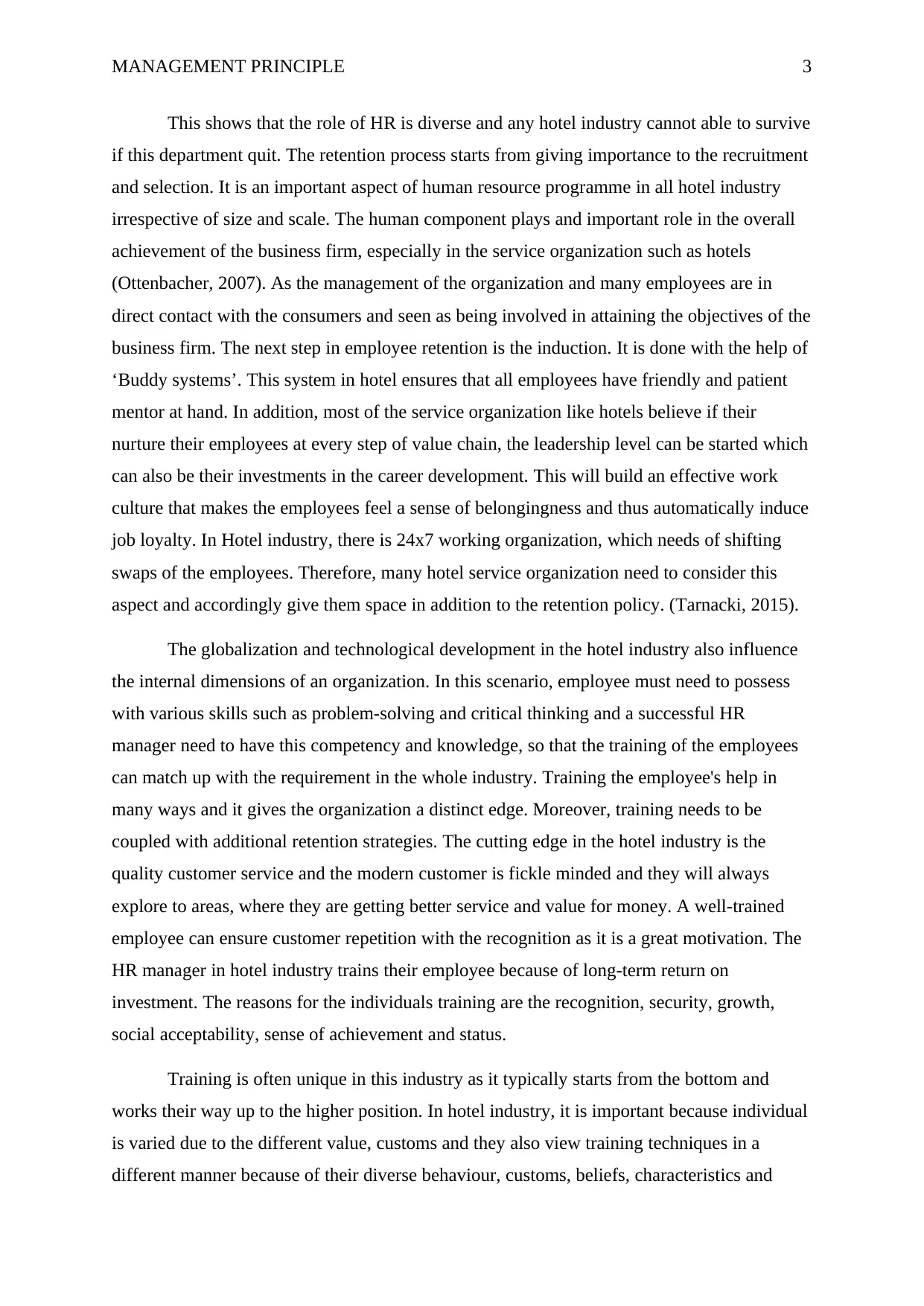
MANAGEMENT PRINCIPLE 3
This shows that the role of HR is diverse and any hotel industry cannot able to survive
if this department quit. The retention process starts from giving importance to the recruitment
and selection. It is an important aspect of human resource programme in all hotel industry
irrespective of size and scale. The human component plays and important role in the overall
achievement of the business firm, especially in the service organization such as hotels
(Ottenbacher, 2007). As the management of the organization and many employees are in
direct contact with the consumers and seen as being involved in attaining the objectives of the
business firm. The next step in employee retention is the induction. It is done with the help of
‘Buddy systems’. This system in hotel ensures that all employees have friendly and patient
mentor at hand. In addition, most of the service organization like hotels believe if their
nurture their employees at every step of value chain, the leadership level can be started which
can also be their investments in the career development. This will build an effective work
culture that makes the employees feel a sense of belongingness and thus automatically induce
job loyalty. In Hotel industry, there is 24x7 working organization, which needs of shifting
swaps of the employees. Therefore, many hotel service organization need to consider this
aspect and accordingly give them space in addition to the retention policy. (Tarnacki, 2015).
The globalization and technological development in the hotel industry also influence
the internal dimensions of an organization. In this scenario, employee must need to possess
with various skills such as problem-solving and critical thinking and a successful HR
manager need to have this competency and knowledge, so that the training of the employees
can match up with the requirement in the whole industry. Training the employee's help in
many ways and it gives the organization a distinct edge. Moreover, training needs to be
coupled with additional retention strategies. The cutting edge in the hotel industry is the
quality customer service and the modern customer is fickle minded and they will always
explore to areas, where they are getting better service and value for money. A well-trained
employee can ensure customer repetition with the recognition as it is a great motivation. The
HR manager in hotel industry trains their employee because of long-term return on
investment. The reasons for the individuals training are the recognition, security, growth,
social acceptability, sense of achievement and status.
Training is often unique in this industry as it typically starts from the bottom and
works their way up to the higher position. In hotel industry, it is important because individual
is varied due to the different value, customs and they also view training techniques in a
different manner because of their diverse behaviour, customs, beliefs, characteristics and
This shows that the role of HR is diverse and any hotel industry cannot able to survive
if this department quit. The retention process starts from giving importance to the recruitment
and selection. It is an important aspect of human resource programme in all hotel industry
irrespective of size and scale. The human component plays and important role in the overall
achievement of the business firm, especially in the service organization such as hotels
(Ottenbacher, 2007). As the management of the organization and many employees are in
direct contact with the consumers and seen as being involved in attaining the objectives of the
business firm. The next step in employee retention is the induction. It is done with the help of
‘Buddy systems’. This system in hotel ensures that all employees have friendly and patient
mentor at hand. In addition, most of the service organization like hotels believe if their
nurture their employees at every step of value chain, the leadership level can be started which
can also be their investments in the career development. This will build an effective work
culture that makes the employees feel a sense of belongingness and thus automatically induce
job loyalty. In Hotel industry, there is 24x7 working organization, which needs of shifting
swaps of the employees. Therefore, many hotel service organization need to consider this
aspect and accordingly give them space in addition to the retention policy. (Tarnacki, 2015).
The globalization and technological development in the hotel industry also influence
the internal dimensions of an organization. In this scenario, employee must need to possess
with various skills such as problem-solving and critical thinking and a successful HR
manager need to have this competency and knowledge, so that the training of the employees
can match up with the requirement in the whole industry. Training the employee's help in
many ways and it gives the organization a distinct edge. Moreover, training needs to be
coupled with additional retention strategies. The cutting edge in the hotel industry is the
quality customer service and the modern customer is fickle minded and they will always
explore to areas, where they are getting better service and value for money. A well-trained
employee can ensure customer repetition with the recognition as it is a great motivation. The
HR manager in hotel industry trains their employee because of long-term return on
investment. The reasons for the individuals training are the recognition, security, growth,
social acceptability, sense of achievement and status.
Training is often unique in this industry as it typically starts from the bottom and
works their way up to the higher position. In hotel industry, it is important because individual
is varied due to the different value, customs and they also view training techniques in a
different manner because of their diverse behaviour, customs, beliefs, characteristics and
Paraphrase This Document
Need a fresh take? Get an instant paraphrase of this document with our AI Paraphraser
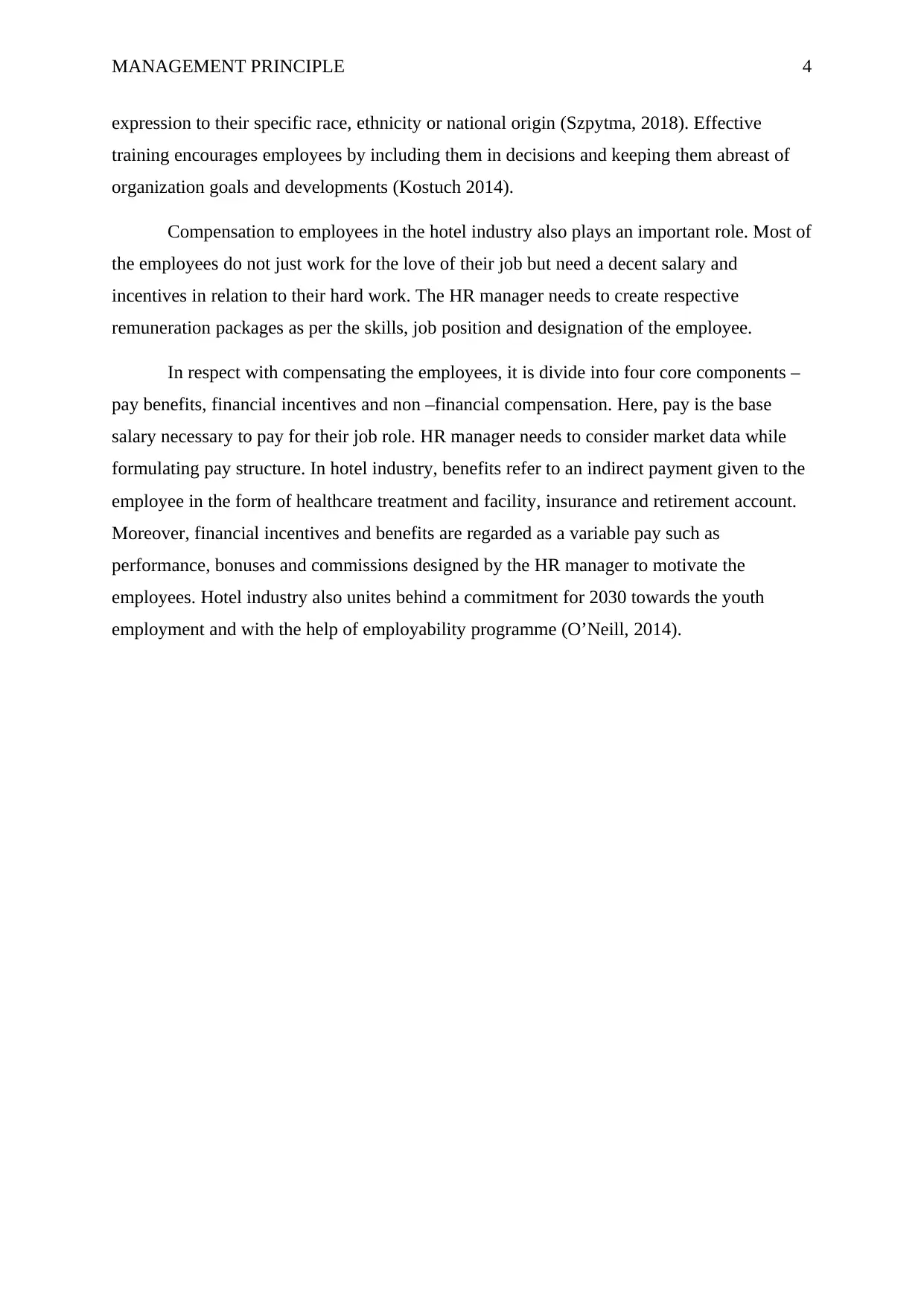
MANAGEMENT PRINCIPLE 4
expression to their specific race, ethnicity or national origin (Szpytma, 2018). Effective
training encourages employees by including them in decisions and keeping them abreast of
organization goals and developments (Kostuch 2014).
Compensation to employees in the hotel industry also plays an important role. Most of
the employees do not just work for the love of their job but need a decent salary and
incentives in relation to their hard work. The HR manager needs to create respective
remuneration packages as per the skills, job position and designation of the employee.
In respect with compensating the employees, it is divide into four core components –
pay benefits, financial incentives and non –financial compensation. Here, pay is the base
salary necessary to pay for their job role. HR manager needs to consider market data while
formulating pay structure. In hotel industry, benefits refer to an indirect payment given to the
employee in the form of healthcare treatment and facility, insurance and retirement account.
Moreover, financial incentives and benefits are regarded as a variable pay such as
performance, bonuses and commissions designed by the HR manager to motivate the
employees. Hotel industry also unites behind a commitment for 2030 towards the youth
employment and with the help of employability programme (O’Neill, 2014).
expression to their specific race, ethnicity or national origin (Szpytma, 2018). Effective
training encourages employees by including them in decisions and keeping them abreast of
organization goals and developments (Kostuch 2014).
Compensation to employees in the hotel industry also plays an important role. Most of
the employees do not just work for the love of their job but need a decent salary and
incentives in relation to their hard work. The HR manager needs to create respective
remuneration packages as per the skills, job position and designation of the employee.
In respect with compensating the employees, it is divide into four core components –
pay benefits, financial incentives and non –financial compensation. Here, pay is the base
salary necessary to pay for their job role. HR manager needs to consider market data while
formulating pay structure. In hotel industry, benefits refer to an indirect payment given to the
employee in the form of healthcare treatment and facility, insurance and retirement account.
Moreover, financial incentives and benefits are regarded as a variable pay such as
performance, bonuses and commissions designed by the HR manager to motivate the
employees. Hotel industry also unites behind a commitment for 2030 towards the youth
employment and with the help of employability programme (O’Neill, 2014).
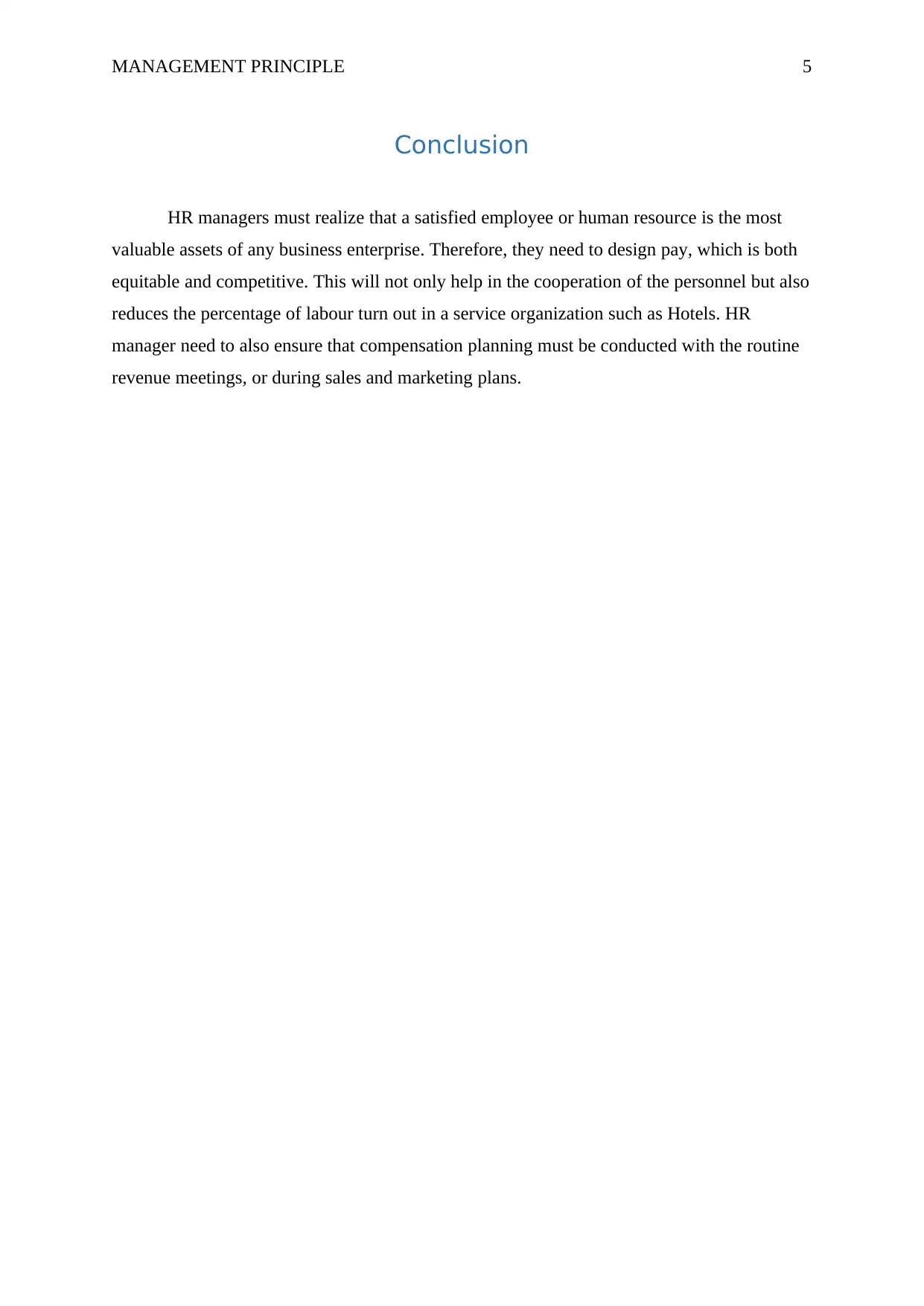
MANAGEMENT PRINCIPLE 5
Conclusion
HR managers must realize that a satisfied employee or human resource is the most
valuable assets of any business enterprise. Therefore, they need to design pay, which is both
equitable and competitive. This will not only help in the cooperation of the personnel but also
reduces the percentage of labour turn out in a service organization such as Hotels. HR
manager need to also ensure that compensation planning must be conducted with the routine
revenue meetings, or during sales and marketing plans.
Conclusion
HR managers must realize that a satisfied employee or human resource is the most
valuable assets of any business enterprise. Therefore, they need to design pay, which is both
equitable and competitive. This will not only help in the cooperation of the personnel but also
reduces the percentage of labour turn out in a service organization such as Hotels. HR
manager need to also ensure that compensation planning must be conducted with the routine
revenue meetings, or during sales and marketing plans.
⊘ This is a preview!⊘
Do you want full access?
Subscribe today to unlock all pages.

Trusted by 1+ million students worldwide
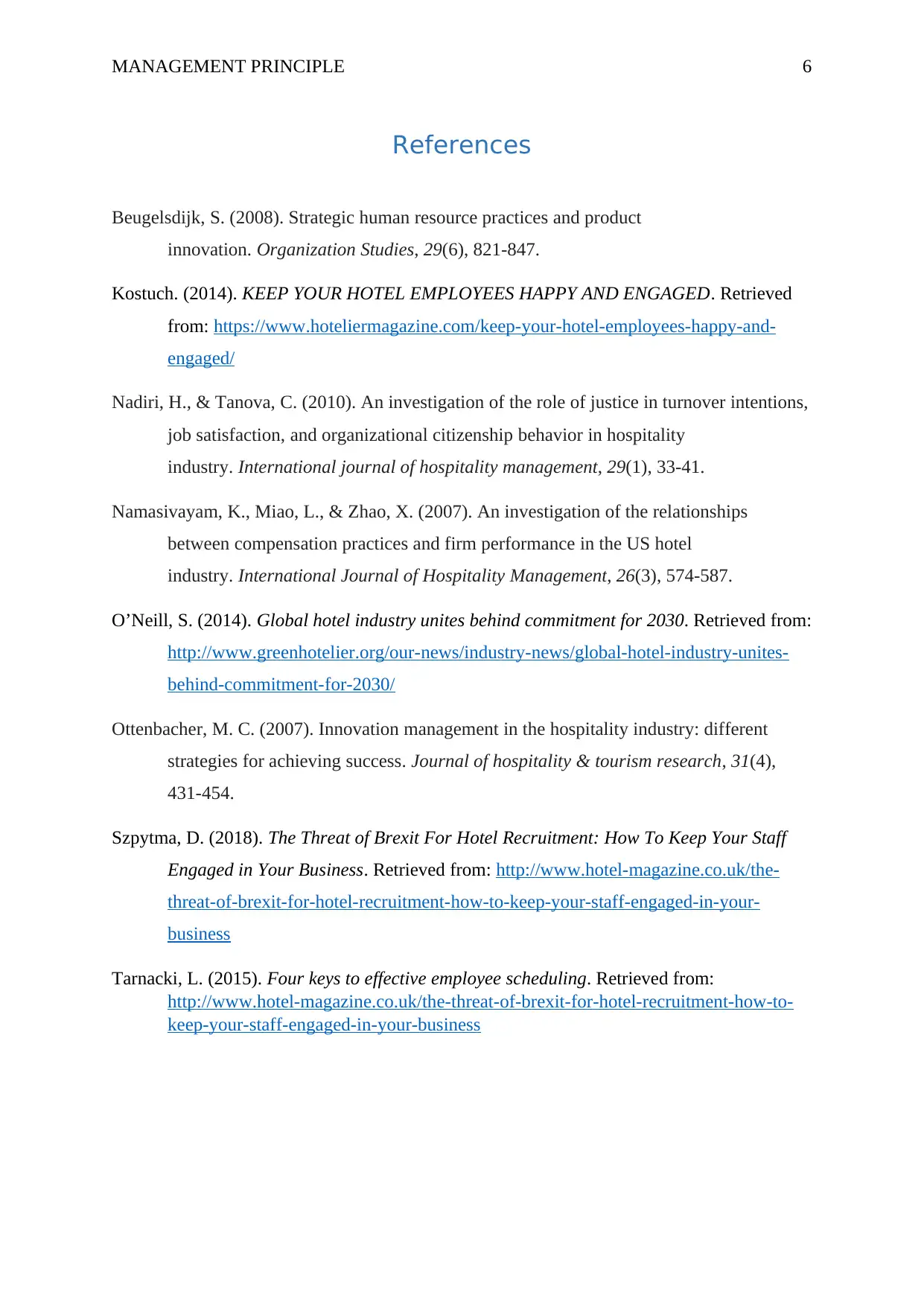
MANAGEMENT PRINCIPLE 6
References
Beugelsdijk, S. (2008). Strategic human resource practices and product
innovation. Organization Studies, 29(6), 821-847.
Kostuch. (2014). KEEP YOUR HOTEL EMPLOYEES HAPPY AND ENGAGED. Retrieved
from: https://www.hoteliermagazine.com/keep-your-hotel-employees-happy-and-
engaged/
Nadiri, H., & Tanova, C. (2010). An investigation of the role of justice in turnover intentions,
job satisfaction, and organizational citizenship behavior in hospitality
industry. International journal of hospitality management, 29(1), 33-41.
Namasivayam, K., Miao, L., & Zhao, X. (2007). An investigation of the relationships
between compensation practices and firm performance in the US hotel
industry. International Journal of Hospitality Management, 26(3), 574-587.
O’Neill, S. (2014). Global hotel industry unites behind commitment for 2030. Retrieved from:
http://www.greenhotelier.org/our-news/industry-news/global-hotel-industry-unites-
behind-commitment-for-2030/
Ottenbacher, M. C. (2007). Innovation management in the hospitality industry: different
strategies for achieving success. Journal of hospitality & tourism research, 31(4),
431-454.
Szpytma, D. (2018). The Threat of Brexit For Hotel Recruitment: How To Keep Your Staff
Engaged in Your Business. Retrieved from: http://www.hotel-magazine.co.uk/the-
threat-of-brexit-for-hotel-recruitment-how-to-keep-your-staff-engaged-in-your-
business
Tarnacki, L. (2015). Four keys to effective employee scheduling. Retrieved from:
http://www.hotel-magazine.co.uk/the-threat-of-brexit-for-hotel-recruitment-how-to-
keep-your-staff-engaged-in-your-business
References
Beugelsdijk, S. (2008). Strategic human resource practices and product
innovation. Organization Studies, 29(6), 821-847.
Kostuch. (2014). KEEP YOUR HOTEL EMPLOYEES HAPPY AND ENGAGED. Retrieved
from: https://www.hoteliermagazine.com/keep-your-hotel-employees-happy-and-
engaged/
Nadiri, H., & Tanova, C. (2010). An investigation of the role of justice in turnover intentions,
job satisfaction, and organizational citizenship behavior in hospitality
industry. International journal of hospitality management, 29(1), 33-41.
Namasivayam, K., Miao, L., & Zhao, X. (2007). An investigation of the relationships
between compensation practices and firm performance in the US hotel
industry. International Journal of Hospitality Management, 26(3), 574-587.
O’Neill, S. (2014). Global hotel industry unites behind commitment for 2030. Retrieved from:
http://www.greenhotelier.org/our-news/industry-news/global-hotel-industry-unites-
behind-commitment-for-2030/
Ottenbacher, M. C. (2007). Innovation management in the hospitality industry: different
strategies for achieving success. Journal of hospitality & tourism research, 31(4),
431-454.
Szpytma, D. (2018). The Threat of Brexit For Hotel Recruitment: How To Keep Your Staff
Engaged in Your Business. Retrieved from: http://www.hotel-magazine.co.uk/the-
threat-of-brexit-for-hotel-recruitment-how-to-keep-your-staff-engaged-in-your-
business
Tarnacki, L. (2015). Four keys to effective employee scheduling. Retrieved from:
http://www.hotel-magazine.co.uk/the-threat-of-brexit-for-hotel-recruitment-how-to-
keep-your-staff-engaged-in-your-business
1 out of 7
Related Documents
Your All-in-One AI-Powered Toolkit for Academic Success.
+13062052269
info@desklib.com
Available 24*7 on WhatsApp / Email
![[object Object]](/_next/static/media/star-bottom.7253800d.svg)
Unlock your academic potential
Copyright © 2020–2026 A2Z Services. All Rights Reserved. Developed and managed by ZUCOL.





